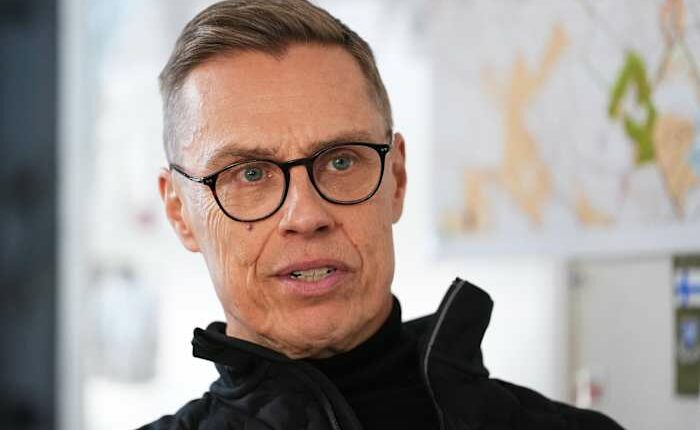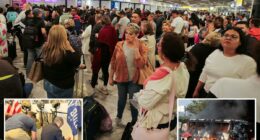Share this @internewscast.com

HALVALA – The prospect of a ceasefire in Ukraine appears dim until at least the spring, according to Finnish President Alexander Stubb. He emphasized the importance of continued European support for Ukraine, despite the country’s ongoing corruption scandal. Stubb shared these thoughts with The Associated Press.
The continent, he noted, will need to harness “sisu”—a Finnish term embodying endurance, resilience, and grit—to endure the upcoming winter months. This is necessary as Russia persists in its hybrid warfare and information campaigns across Europe.
Stubb, as a significant European liaison between U.S. President Donald Trump and Ukrainian President Volodymyr Zelenskyy, also embodies this resilience. Finland, although a smaller nation, is strategically critical due to its extensive 1,340-kilometer (830-mile) border with Russia, making Stubb acutely aware of the stakes involved.
Historically, Finland ceded around 10% of its territory to Russia following two conflicts in the 1940s and maintained a neutral military stance until Russia’s large-scale invasion of Ukraine prompted it to join NATO. Stubb utilizes his solid rapport with Trump—bolstered by shared golfing experiences and frequent communications—to advocate for Ukraine’s cause effectively.
“I can convey to President Trump what Finland has experienced, my perspective on the battlefield, and strategies for dealing with Russian President Vladimir Putin,” Stubb remarked. “If even one out of ten suggestions is accepted, that’s a success.”
In an interview with the AP on Saturday, held at a military base north of Helsinki, Stubb observed Finnish volunteers engaging in defense training. Sporting a jacket with “sisu” boldly printed on the back, he watched as participants practiced rescuing wounded soldiers from conflict scenarios amid frigid conditions.
Stubb told AP that Zelenskyy must deal quickly with allegations of kickbacks and embezzlement, saying the scandal plays into the hands of Russia. Nonetheless, he urged European leaders to look at boosting financial and military support for Kyiv which is also facing creeping gains by Russia on the battlefield.
“I’m not very optimistic about achieving a ceasefire or the beginning of peace negotiations, at least this year,” Stubb said, adding it would be good to “get something going” by March.
The three big questions on the road to a ceasefire are security guarantees for Ukraine, rebuilding its economy and coming to some sort of understanding about territorial claims, he said.
To bring peace to Ukraine, Stubb said, Trump and European leaders need to maximize pressure on Russia and on Putin in order to change his strategic thinking. Putin “basically wants to deny the independence, sovereignty and territorial integrity of Ukraine,” aims that have not altered since the war began nearly four years ago, Stubb said.
To do this, he suggested using tools such as the hundreds of billions of dollars in frozen Russian assets held in Europe as collateral to fund Ukraine, as well as increasing military pressure on Moscow.
Stubb praised Trump for sanctioning the major Russian energy companies Lukoil and Rosneft in October, saying he did “an excellent job,” but argued more must be done to give Ukraine the capacity to hit Russia’s “military or defense industry.”
Last month Trump denied a Ukrainian request for long-range Tomahawk missiles which would theoretically allow Ukraine to strike deeper into Russia – although Kyiv does not currently have any launchers or platforms from which to fire them.
Ukraine is still negotiating with the U.S. for more firepower, Stubb indicated.
Trump’s swings on Ukraine
In mid-October the White House announced Trump would meet Putin in Budapest before abruptly canceling the meeting less than a week later.
The decision came after a call between Secretary of State Marco Rubio and Russian Foreign Minister Sergey Lavrov where Rubio probably realized that “the Russians haven’t moved an inch,” Stubb said, and there was “no point in taking President Trump into a situation whereby he doesn’t get a deal or anything.”
The cancellation was “another example of a strategic mistake by the Russians. They had an opportunity and they blew it,” Stubb said.
Trump has swung back and forth between seeking rapprochement with Putin and applying pressure to him, and has done the same with Zelenskyy. Stubb said he deals with any shifts by being “quite patient” and living with “reality.”
“You can’t have illusions about things that you would like to see happening,” the Finnish president said. “I’ve tried personally to focus on things such as: We need security guarantees for Ukraine. How to build those? We need a ceasefire. How can we get that?
“It’s been a bit of a grind. I guess you need ‘sisu’ in these types of negotiations as well.”
But, he said, the work is paying off and the military options for guaranteeing Ukraine’s security once a ceasefire or peace negotiation is reached are now “clear,” with various countries having committed resources — although he declined to give more details, citing confidential military planning.
Despite some of Ukraine’s missteps, Stubb is unstinting in his praise for Zelenskyy. “I admire a lot of the things that he’s doing because to lead a country in a war … is existential. You learn a lot from other human beings in that situation,” he said.
Stubb has Trump’s ear
When it comes to dealing with Donald Trump, Stubb is in a better position than many European leaders. In his youth, he studied in the United States on a golf scholarship, and in March the two spent about seven hours playing a round at Mar-a-Lago.
Golf was a “door-opener,” and helped him create a bond with the U.S. president, he suggested. While Trump and Zelenskyy have a notoriously tempestuous relationship, Stubb said he and other European leaders can help act as a bridge between them.
“We interpret President Trump to President Zelenskyy and vice versa,” he said.
But when it comes to Putin, only one person should negotiate directly and publicly with him and that’s Trump, Stubb indicated, suggesting the European Union is unlikely to open a direct channel of communication with the Russian leader any time soon.
Russian attacks in Europe
At the same time Trump is leading negotiations with Putin, multiple European countries have faced incursions from Russian drones — suspected or confirmed — as well as fighter jets and an alleged widespread Russian sabotage campaign.
Russia is not only conducting a kinetic war in Ukraine but also a hybrid war in Europe, Stubb told AP.
“The line between war and peace has been blurred,” Stubb said
Russia, he said, is trying to destabilize Europe and “cause havoc and panic,” with attacks including arson, vandalism and propaganda.
The way to deal with those threats is to “be Finnish,” Stubb said.
“In other words, be cool, calm, collected and have a little bit of that ‘sisu.’”
Copyright 2025 The Associated Press. All rights reserved. This material may not be published, broadcast, rewritten or redistributed without permission.











